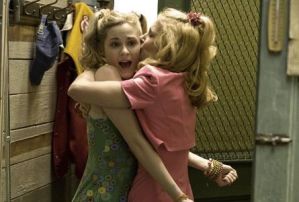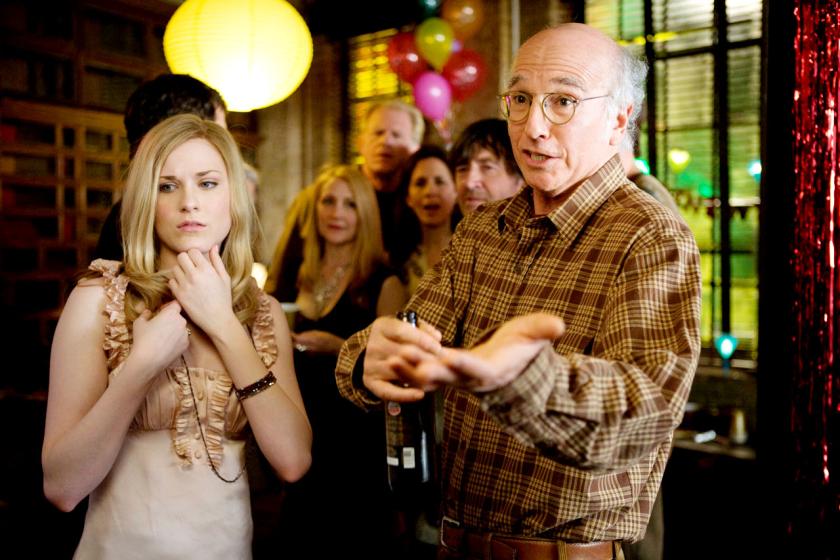n Woody Allen’s Whatever Works, Larry David plays the fourth-wall-breaking narrator and protagonist Boris Yetnikoff. In his early sixties, Boris is an atheist, hypochondriac, divorcee, failed suicide, blowhard existentialist, and world-class curmudgeon, who’s abandoned his career as a nearly-Nobel-level physicist. He’s the most acridly loquacious - and easily the funniest - Woody Allen manqué yet, vehement in his conviction that life is futile, ready to assume that he has thyroid cancer, who wakes screaming “The horror! The horror!”, as mouthed by Kurtz in Heart of Darkness (and Apocalypse Now).
In Woody Allen’s Whatever Works, Larry David plays the fourth-wall-breaking narrator and protagonist Boris Yetnikoff. In his early sixties, Boris is an atheist, hypochondriac, divorcee, failed suicide, blowhard existentialist, and world-class curmudgeon, who’s abandoned his career as a nearly-Nobel-level physicist. He’s the most acridly loquacious - and easily the funniest - Woody Allen manqué yet, vehement in his conviction that life is futile, ready to assume that he has thyroid cancer, who wakes screaming “The horror! The horror!”, as mouthed by Kurtz in Heart of Darkness (and Apocalypse Now). He’s not, therefore, a dainty dish to set before the sweet, naïve, life-loving 21-year-old runaway Mississippi beauty queen Melody St Ann Celestine (Evan Rachel Wood), who cajoles her way into Boris’s Little Italy apartment in search of a meal one night and then decides to stay.
It’s been put to Allen that the 40-year age gap between the film’s leads consciously mirrors the 35-year differential between the filmmaker and his wife, Soon-Yi Previn. He has dismissed this in interviews, noting that he originally wrote the script for Zero Mostel and shelved it when the actor died in 1977. The relationship between the self-vaunted “genius” Boris and the uneducated Melody may suggest an exaggerated version of the emotionally unbalanced relationships between Allen’s Alvy and Mariel Hemingway’s Tracy in Manhattan and Allen’s Gabe and Juliette Lewis’s Rain in Husbands and Wives, though Rain, it’s implied, will be a better writer than Gabe.
No more a role model than the sexpots Allen has written in recent years for Scarlett Johansson, Melody is as dim as Sam (Lysette Anthony), the Sidney Pollack character’s young mistress in Husbands and Wives, but she shares Tracy’s intuitiveness, good nature, and soulfulness. Wood, who’s been given scant opportunity to shine since her outstanding work in Thirteen and Pretty Persuasion, gives her a Carole Lombard-like daffiness. Hearing Melody yell “Entropy!” when a smitten young Englishman (Henry Cavill) confuses her with a kiss aboard a houseboat is delightful.
Whatever Works is a fierce and salty reminder of how invigorating he can be when contemplating mortality, disappointment, and failure without self-pity
Since Boris doesn’t like sex, he makes no attempt to seduce Melody, but her announcement that she has a crush on him is sure to induce a “Ew!” or two from women in the audience - so, too, the incongruous pair’s marriage. Sexual chemistry is less interesting to Allen here (Boris is all but impotent) than companionship, and unappetising though the mismatch may seem, it offers a sharp comic dialectic about the right way to live. Boris infects Melody with his misanthropic “wisdom”, though not so much that he rains on her parade; eventually she tells him that she misses participating with the “inchworms” and “cretins” - ordinary people - from whom he has isolated himself in what she sagely recognises as a prolonged tantrum. Under her sunny influence, he becomes warmer and more gregarious without turning to mush. For a while, they make a go of it. Whether or not they stay together is less important than Boris’s ability to espouse with more optimism than he did earlier in the film his belief that life is made livable only by “whatever happiness you can filch or provide”.
 There’s a barely withheld belligerence in David’s acting, familiar from Curb Your Enthusiasm, that prevents Boris from becoming merely morose and draining a thin tale of necessary energy. Thin it would still be without the intervention of Melody’s mother Marietta (Patricia Clarkson, pictured right with Wood), who tracks down her estranged daughter to New York. She stays on to shed her faded Southern belle persona and become a bohemian photographer whose sexually explicit work reflects her sudden personal liberation. Her equally conservative ex-husband (Ed Begley Jr), Melody’s dad, is also sucked into New York and goes through a life change of his own. These whimsical plot strands are knitted with Boris’s story in the final scene, where he acknowledges the enormous role played in everyone’s life by “blind chance”, a theme the film shares with Allen’s Match Point.
There’s a barely withheld belligerence in David’s acting, familiar from Curb Your Enthusiasm, that prevents Boris from becoming merely morose and draining a thin tale of necessary energy. Thin it would still be without the intervention of Melody’s mother Marietta (Patricia Clarkson, pictured right with Wood), who tracks down her estranged daughter to New York. She stays on to shed her faded Southern belle persona and become a bohemian photographer whose sexually explicit work reflects her sudden personal liberation. Her equally conservative ex-husband (Ed Begley Jr), Melody’s dad, is also sucked into New York and goes through a life change of his own. These whimsical plot strands are knitted with Boris’s story in the final scene, where he acknowledges the enormous role played in everyone’s life by “blind chance”, a theme the film shares with Allen’s Match Point.
That severe Dostoyevskian thriller remains the best Woody Allen film of the last decade, followed by the questing romantic comedy Vicky Cristina Barcelona. As befitting Allen’s first movie in New York since 2004, however, Whatever Works is a fierce and salty reminder of how invigorating he can be when contemplating mortality, disappointment, and failure without self-pity. It’s reminiscent, at times, of the abrasive Deconstructing Harry, a tad mellower though its maker is at 74.
Watch the Whatever Works trailer













Add comment